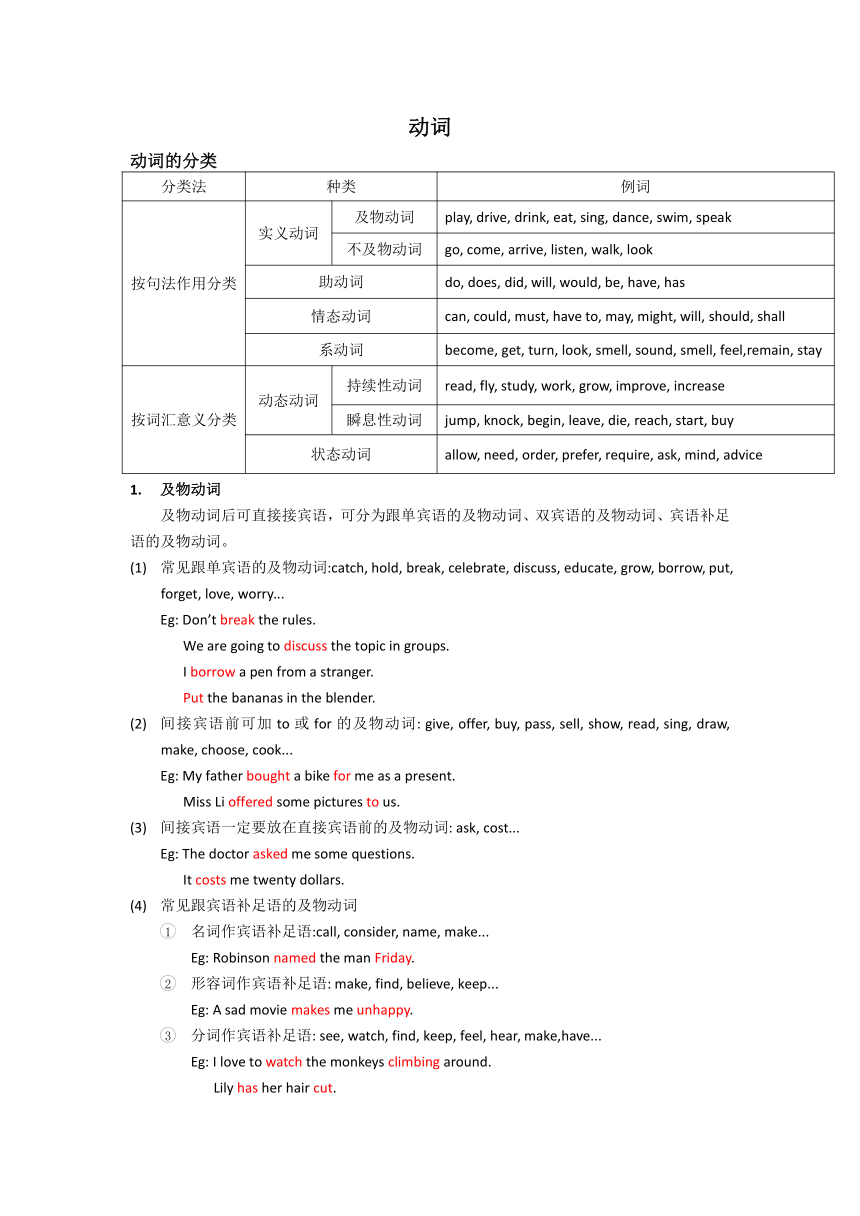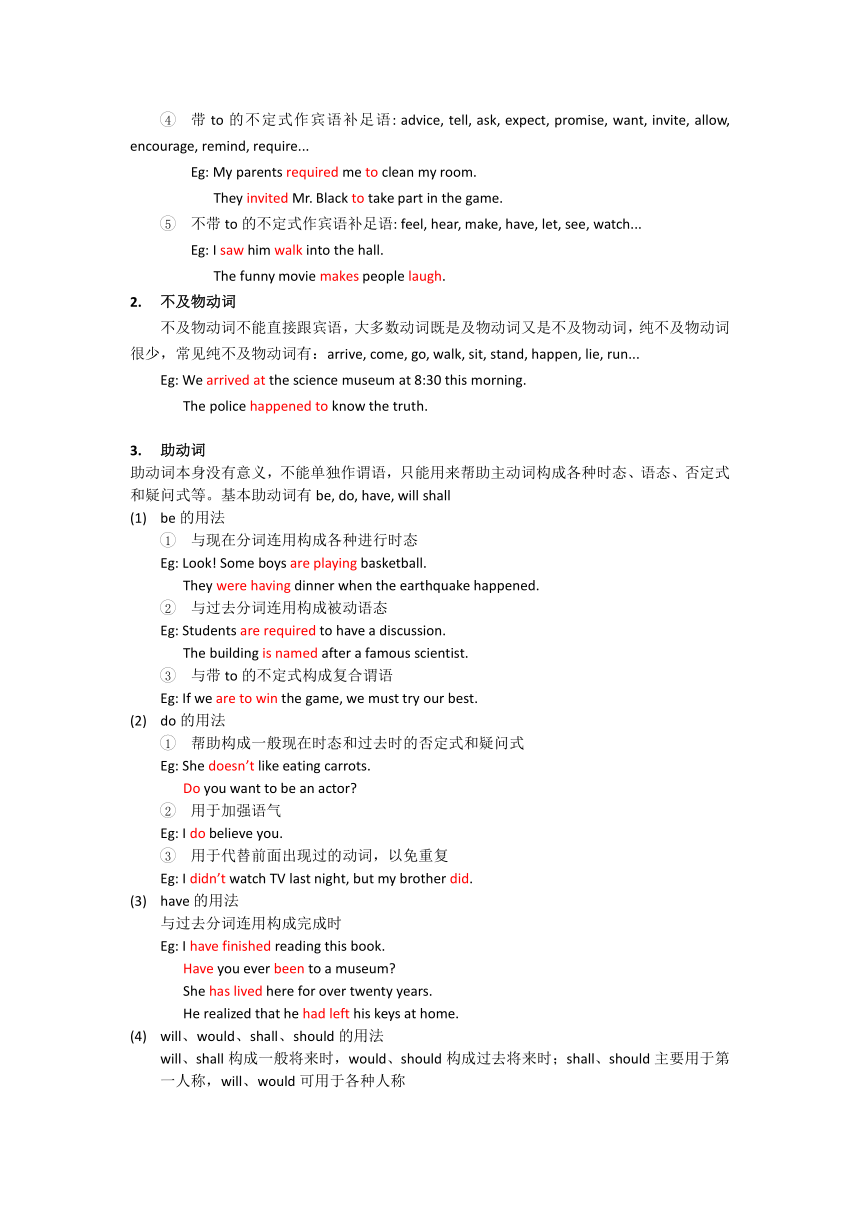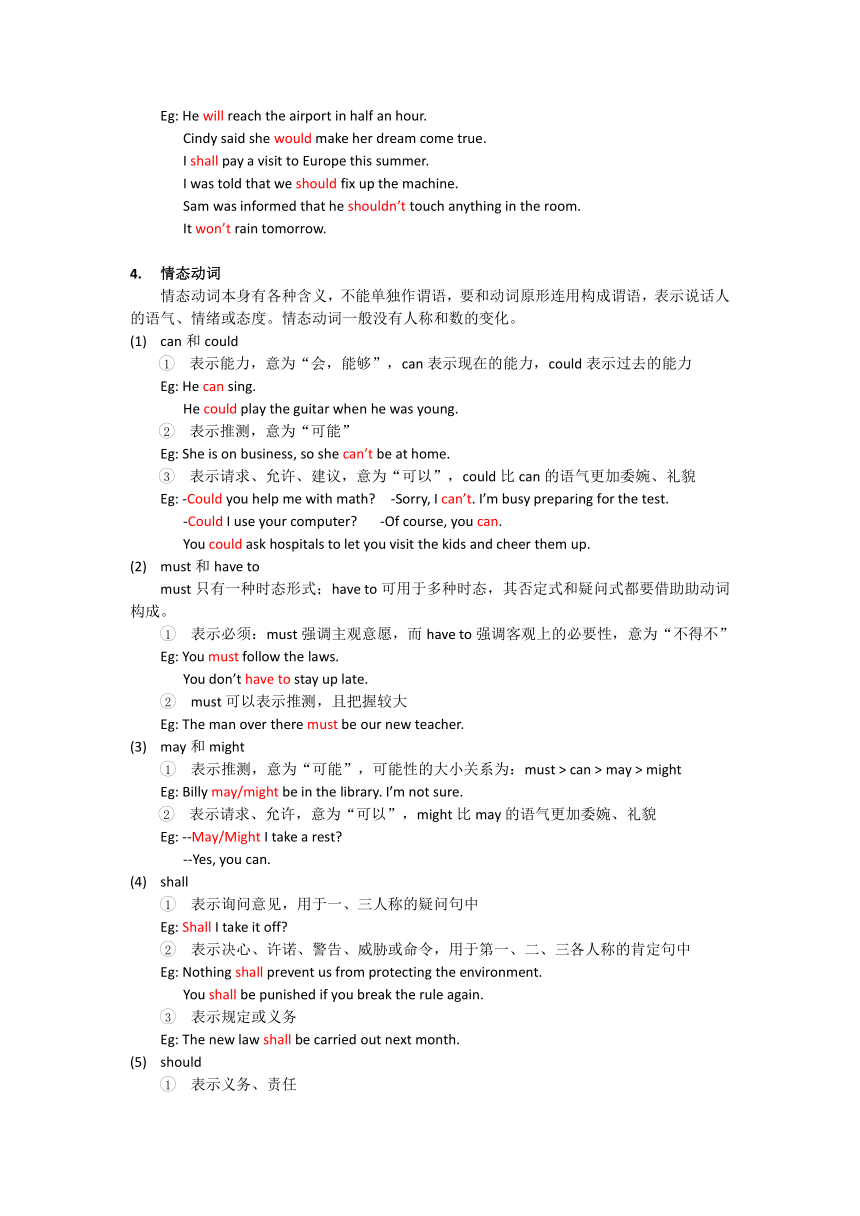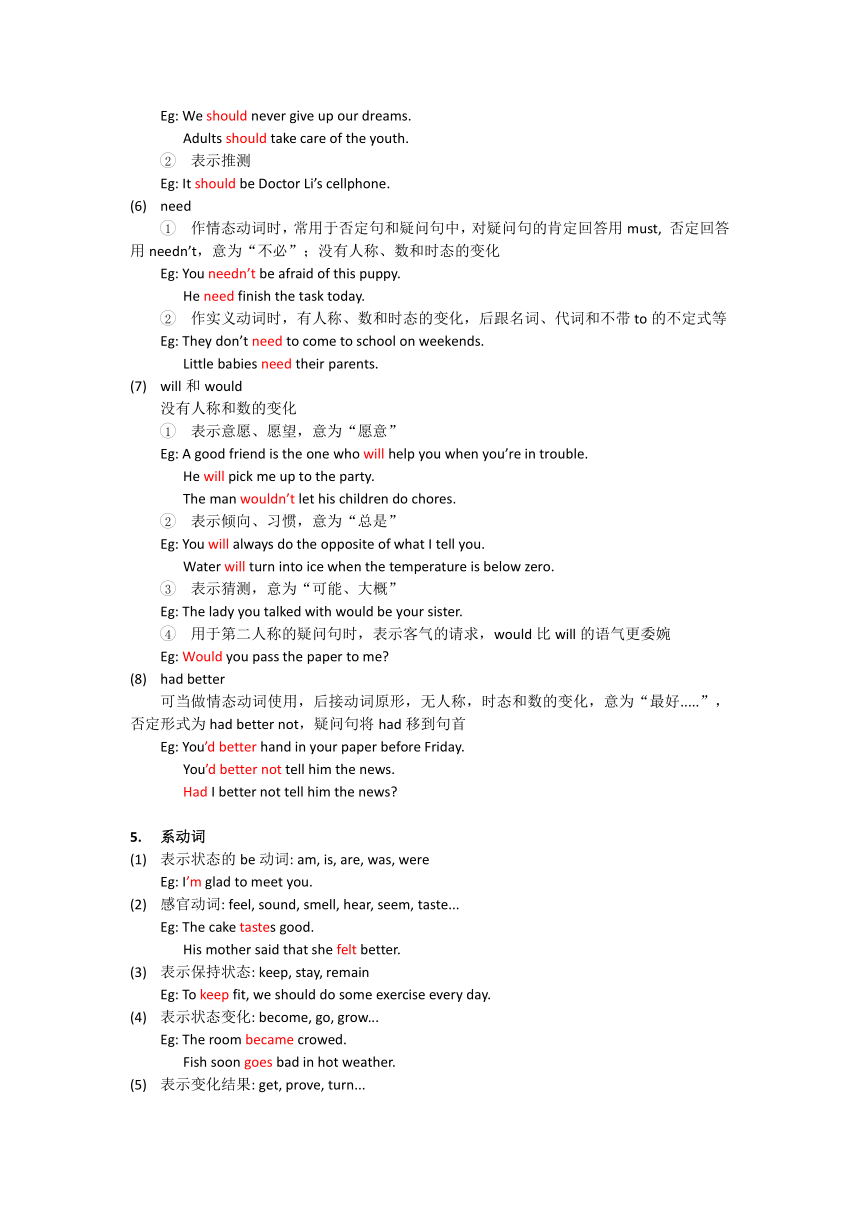2024年中考英语专项复习模块一词汇:9.动词
文档属性
| 名称 | 2024年中考英语专项复习模块一词汇:9.动词 |

|
|
| 格式 | docx | ||
| 文件大小 | 31.3KB | ||
| 资源类型 | 教案 | ||
| 版本资源 | 人教新目标(Go for it)版 | ||
| 科目 | 英语 | ||
| 更新时间 | 2023-08-22 13:40:39 | ||
图片预览




文档简介
动词
动词的分类
分类法 种类 例词
按句法作用分类 实义动词 及物动词 play, drive, drink, eat, sing, dance, swim, speak
不及物动词 go, come, arrive, listen, walk, look
助动词 do, does, did, will, would, be, have, has
情态动词 can, could, must, have to, may, might, will, should, shall
系动词 become, get, turn, look, smell, sound, smell, feel,remain, stay
按词汇意义分类 动态动词 持续性动词 read, fly, study, work, grow, improve, increase
瞬息性动词 jump, knock, begin, leave, die, reach, start, buy
状态动词 allow, need, order, prefer, require, ask, mind, advice
及物动词
及物动词后可直接接宾语,可分为跟单宾语的及物动词、双宾语的及物动词、宾语补足语的及物动词。
常见跟单宾语的及物动词:catch, hold, break, celebrate, discuss, educate, grow, borrow, put, forget, love, worry...
Eg: Don’t break the rules.
We are going to discuss the topic in groups.
I borrow a pen from a stranger.
Put the bananas in the blender.
间接宾语前可加to或for的及物动词: give, offer, buy, pass, sell, show, read, sing, draw, make, choose, cook...
Eg: My father bought a bike for me as a present.
Miss Li offered some pictures to us.
间接宾语一定要放在直接宾语前的及物动词: ask, cost...
Eg: The doctor asked me some questions.
It costs me twenty dollars.
常见跟宾语补足语的及物动词
名词作宾语补足语:call, consider, name, make...
Eg: Robinson named the man Friday.
形容词作宾语补足语: make, find, believe, keep...
Eg: A sad movie makes me unhappy.
分词作宾语补足语: see, watch, find, keep, feel, hear, make,have...
Eg: I love to watch the monkeys climbing around.
Lily has her hair cut.
带to的不定式作宾语补足语: advice, tell, ask, expect, promise, want, invite, allow, encourage, remind, require...
Eg: My parents required me to clean my room.
They invited Mr. Black to take part in the game.
不带to的不定式作宾语补足语: feel, hear, make, have, let, see, watch...
Eg: I saw him walk into the hall.
The funny movie makes people laugh.
不及物动词
不及物动词不能直接跟宾语,大多数动词既是及物动词又是不及物动词,纯不及物动词很少,常见纯不及物动词有:arrive, come, go, walk, sit, stand, happen, lie, run...
Eg: We arrived at the science museum at 8:30 this morning.
The police happened to know the truth.
助动词
助动词本身没有意义,不能单独作谓语,只能用来帮助主动词构成各种时态、语态、否定式和疑问式等。基本助动词有be, do, have, will shall
be的用法
与现在分词连用构成各种进行时态
Eg: Look! Some boys are playing basketball.
They were having dinner when the earthquake happened.
与过去分词连用构成被动语态
Eg: Students are required to have a discussion.
The building is named after a famous scientist.
与带to的不定式构成复合谓语
Eg: If we are to win the game, we must try our best.
do的用法
帮助构成一般现在时态和过去时的否定式和疑问式
Eg: She doesn’t like eating carrots.
Do you want to be an actor
用于加强语气
Eg: I do believe you.
用于代替前面出现过的动词,以免重复
Eg: I didn’t watch TV last night, but my brother did.
have的用法
与过去分词连用构成完成时
Eg: I have finished reading this book.
Have you ever been to a museum
She has lived here for over twenty years.
He realized that he had left his keys at home.
will、would、shall、should的用法
will、shall构成一般将来时,would、should构成过去将来时;shall、should主要用于第一人称,will、would可用于各种人称
Eg: He will reach the airport in half an hour.
Cindy said she would make her dream come true.
I shall pay a visit to Europe this summer.
I was told that we should fix up the machine.
Sam was informed that he shouldn’t touch anything in the room.
It won’t rain tomorrow.
情态动词
情态动词本身有各种含义,不能单独作谓语,要和动词原形连用构成谓语,表示说话人的语气、情绪或态度。情态动词一般没有人称和数的变化。
can和could
表示能力,意为“会,能够”,can表示现在的能力,could表示过去的能力
Eg: He can sing.
He could play the guitar when he was young.
表示推测,意为“可能”
Eg: She is on business, so she can’t be at home.
表示请求、允许、建议,意为“可以”,could比can的语气更加委婉、礼貌
Eg: -Could you help me with math -Sorry, I can’t. I’m busy preparing for the test.
-Could I use your computer -Of course, you can.
You could ask hospitals to let you visit the kids and cheer them up.
must和have to
must只有一种时态形式;have to可用于多种时态,其否定式和疑问式都要借助助动词构成。
表示必须:must强调主观意愿,而have to强调客观上的必要性,意为“不得不”
Eg: You must follow the laws.
You don’t have to stay up late.
must可以表示推测,且把握较大
Eg: The man over there must be our new teacher.
may和might
表示推测,意为“可能”,可能性的大小关系为:must > can > may > might
Eg: Billy may/might be in the library. I’m not sure.
表示请求、允许,意为“可以”,might比may的语气更加委婉、礼貌
Eg: --May/Might I take a rest
--Yes, you can.
shall
表示询问意见,用于一、三人称的疑问句中
Eg: Shall I take it off
表示决心、许诺、警告、威胁或命令,用于第一、二、三各人称的肯定句中
Eg: Nothing shall prevent us from protecting the environment.
You shall be punished if you break the rule again.
表示规定或义务
Eg: The new law shall be carried out next month.
should
表示义务、责任
Eg: We should never give up our dreams.
Adults should take care of the youth.
表示推测
Eg: It should be Doctor Li’s cellphone.
need
作情态动词时,常用于否定句和疑问句中,对疑问句的肯定回答用must, 否定回答用needn’t,意为“不必”;没有人称、数和时态的变化
Eg: You needn’t be afraid of this puppy.
He need finish the task today.
作实义动词时,有人称、数和时态的变化,后跟名词、代词和不带to的不定式等
Eg: They don’t need to come to school on weekends.
Little babies need their parents.
will和would
没有人称和数的变化
表示意愿、愿望,意为“愿意”
Eg: A good friend is the one who will help you when you’re in trouble.
He will pick me up to the party.
The man wouldn’t let his children do chores.
表示倾向、习惯,意为“总是”
Eg: You will always do the opposite of what I tell you.
Water will turn into ice when the temperature is below zero.
表示猜测,意为“可能、大概”
Eg: The lady you talked with would be your sister.
用于第二人称的疑问句时,表示客气的请求,would比will的语气更委婉
Eg: Would you pass the paper to me
had better
可当做情态动词使用,后接动词原形,无人称,时态和数的变化,意为“最好.....”,否定形式为had better not,疑问句将had移到句首
Eg: You’d better hand in your paper before Friday.
You’d better not tell him the news.
Had I better not tell him the news
系动词
表示状态的be动词: am, is, are, was, were
Eg: I’m glad to meet you.
感官动词: feel, sound, smell, hear, seem, taste...
Eg: The cake tastes good.
His mother said that she felt better.
表示保持状态: keep, stay, remain
Eg: To keep fit, we should do some exercise every day.
表示状态变化: become, go, grow...
Eg: The room became crowed.
Fish soon goes bad in hot weather.
表示变化结果: get, prove, turn...
Eg: When my son gets older, he wants to be a musician.
持续性动词和瞬息性动词
持续性动词表示可持续的动作或状态,瞬息性动词表示短暂行为或事件的动词
持续性动词可与表示一段时间的状语连用,但是瞬息性动词不可以
Eg: I have had this bike for three years.
You can keep the book for seven days.
瞬息性动词的否定式可与表示一段时间的状语连用
Eg: The storm hasn’t stopped since two hours ago.
动词的形式
动词的第三人称单数形式(用于构成一般现在时)
规则 动词原形 第三人称单数形式
一般在词尾加-s play plays
以/s/、/ /、/t /音素结尾或以-o结尾的动词,加-es fix, finish, watch, go fixes, finishes, watches, goes
以“辅音字母+y”结尾的动词,去y加-ies study studies
动词的现在分词形式(主要用于构成进行时)
规则 动词原形 -ing形式
一般直接在词尾加-ing work working
以不发音的e结尾,去掉e再加-ing ride riding
以重读闭音节结尾,末尾只有一个辅音字母的动词,要双写最后一个辅音字母再加-ing stop stopping
少数以-ie结尾的动词,先变ie为y,再加-ing die, tie, lie dying, tying, lying
以-ee, -ye等结尾的动词,直接加-ing see, eye seeing, eyeing
动词的过去式和过去分词形式(过去式主要用于构成各种一般过去时,过去分词主要用来构成现在完成时、过去完成时和被动语态)
规则动词
规则 动词原形 过去式 过去分词
一般直接加-ed watch watched watched
以-e结尾,加-d love loved loved
以“辅音字母+y”结尾,去y加-ied cry cried cried
以重读闭音节结尾,末尾只有一个辅音字母的动词,要双写最后一个辅音字母再加-ed plan planned planned
不规则动词
动词原形 过去式 过去分词
Be(am,is,are) was,were been
begin began begun
break broke broken
give gave given
speak spoke spoken
drive drove driven
ride rode ridden
write wrote written
buy bought bought
feel felt felt
spell spelt spelt
put put put
cut cut cut
cost cost cost
read/ri:d/ read/red/ read/red/
sell sold sold
tell told told
spend spent spent
send sent sent
grow grew grown
throw threw thrown
lie lied(说谎) lied(说谎)
lay(躺) lain(躺)
短语动词
动词+介词
arrive in/at ask for look after look at look for listen to wait for depend on join in talk to/with shout at/to
动词+副词
break down break out break up turn on turn off turn up turn down give up give away give in put up put on put away pick up stay up
动词+副词+介词
come up with look forward to run out of get along with put up with
动词+名词
take care take place make the bed lose heart lose weight make a difference make friends have fun
动词+名词+介词
take part in take pride in take place of take charge of pay attention to
make one’s way to
动词+形容词
make sure come true keep fit stay health feel sad sound good smell bad
练习:
1.-What's the matter with Daniel He isn't at school today.
-His arms hurt. He was _______ by a car this morning.
A. treated B.hit C. operated D. cured
2. Mum is making lunch. It _______so nice!
A smells B. tastes C.feels D. sounds
3. There was something wrong with the phone. We couldn’t______each other clearly.
A listen B.sound C. hear D.speak
4. You'd better______ the test paper before handing it in.
A.go ahead B.go on C. go off D. go over
5. More and more teenagers in the countryside are______ their hometowns at an early age to look for work in the cities.
A. going to B. leaving C. beginning D. coming to
6. -Do you think our basketball team will win the match
-Yes, we have better players. So I____them to win.
A. hope B. help C. expect D.wish
7. She _______ my invitation because she had to help her mother with chores.
A. took down B. put down C. turned down D. wrote down
8.-How is Steven now
-I hear the company________ him a good job, but he refused it.
A. provided B.offered C. passed D. introduced
9. Since I studied abroad last year, I have always______ my family.
A. guessed B. thought C.missed D.reached
10. -Your mother___younger than she is.
-Thank you for saying so.
A.looks B.listens C. sees D. hears
11. -Jenny, I hear there will be an art club in our school.
-Wonderful!I can't wait to_____it.
repeat B.forget C. receive D. join
-Where can we get a bike
-Let’s _____.
lend one from Sam B. lend Sam one
C.borrow one to Sam D.borrow one from Sam
13.He could _______ neither Spanish nor French. So I ______ with him in Chinese.
A.talk;told B.speak;talked C.say;spoke D.tell;talked
14. They walked home last night because they couldn’t___ to take a taxi.
A. Leave B. buy C. afford D. allow
15.-I don't know where to go this summer vacation.
-Why not_____ visiting Beijing There are many places of interest there.
A. suggest B. wonder C.consider D.regard
动词的分类
分类法 种类 例词
按句法作用分类 实义动词 及物动词 play, drive, drink, eat, sing, dance, swim, speak
不及物动词 go, come, arrive, listen, walk, look
助动词 do, does, did, will, would, be, have, has
情态动词 can, could, must, have to, may, might, will, should, shall
系动词 become, get, turn, look, smell, sound, smell, feel,remain, stay
按词汇意义分类 动态动词 持续性动词 read, fly, study, work, grow, improve, increase
瞬息性动词 jump, knock, begin, leave, die, reach, start, buy
状态动词 allow, need, order, prefer, require, ask, mind, advice
及物动词
及物动词后可直接接宾语,可分为跟单宾语的及物动词、双宾语的及物动词、宾语补足语的及物动词。
常见跟单宾语的及物动词:catch, hold, break, celebrate, discuss, educate, grow, borrow, put, forget, love, worry...
Eg: Don’t break the rules.
We are going to discuss the topic in groups.
I borrow a pen from a stranger.
Put the bananas in the blender.
间接宾语前可加to或for的及物动词: give, offer, buy, pass, sell, show, read, sing, draw, make, choose, cook...
Eg: My father bought a bike for me as a present.
Miss Li offered some pictures to us.
间接宾语一定要放在直接宾语前的及物动词: ask, cost...
Eg: The doctor asked me some questions.
It costs me twenty dollars.
常见跟宾语补足语的及物动词
名词作宾语补足语:call, consider, name, make...
Eg: Robinson named the man Friday.
形容词作宾语补足语: make, find, believe, keep...
Eg: A sad movie makes me unhappy.
分词作宾语补足语: see, watch, find, keep, feel, hear, make,have...
Eg: I love to watch the monkeys climbing around.
Lily has her hair cut.
带to的不定式作宾语补足语: advice, tell, ask, expect, promise, want, invite, allow, encourage, remind, require...
Eg: My parents required me to clean my room.
They invited Mr. Black to take part in the game.
不带to的不定式作宾语补足语: feel, hear, make, have, let, see, watch...
Eg: I saw him walk into the hall.
The funny movie makes people laugh.
不及物动词
不及物动词不能直接跟宾语,大多数动词既是及物动词又是不及物动词,纯不及物动词很少,常见纯不及物动词有:arrive, come, go, walk, sit, stand, happen, lie, run...
Eg: We arrived at the science museum at 8:30 this morning.
The police happened to know the truth.
助动词
助动词本身没有意义,不能单独作谓语,只能用来帮助主动词构成各种时态、语态、否定式和疑问式等。基本助动词有be, do, have, will shall
be的用法
与现在分词连用构成各种进行时态
Eg: Look! Some boys are playing basketball.
They were having dinner when the earthquake happened.
与过去分词连用构成被动语态
Eg: Students are required to have a discussion.
The building is named after a famous scientist.
与带to的不定式构成复合谓语
Eg: If we are to win the game, we must try our best.
do的用法
帮助构成一般现在时态和过去时的否定式和疑问式
Eg: She doesn’t like eating carrots.
Do you want to be an actor
用于加强语气
Eg: I do believe you.
用于代替前面出现过的动词,以免重复
Eg: I didn’t watch TV last night, but my brother did.
have的用法
与过去分词连用构成完成时
Eg: I have finished reading this book.
Have you ever been to a museum
She has lived here for over twenty years.
He realized that he had left his keys at home.
will、would、shall、should的用法
will、shall构成一般将来时,would、should构成过去将来时;shall、should主要用于第一人称,will、would可用于各种人称
Eg: He will reach the airport in half an hour.
Cindy said she would make her dream come true.
I shall pay a visit to Europe this summer.
I was told that we should fix up the machine.
Sam was informed that he shouldn’t touch anything in the room.
It won’t rain tomorrow.
情态动词
情态动词本身有各种含义,不能单独作谓语,要和动词原形连用构成谓语,表示说话人的语气、情绪或态度。情态动词一般没有人称和数的变化。
can和could
表示能力,意为“会,能够”,can表示现在的能力,could表示过去的能力
Eg: He can sing.
He could play the guitar when he was young.
表示推测,意为“可能”
Eg: She is on business, so she can’t be at home.
表示请求、允许、建议,意为“可以”,could比can的语气更加委婉、礼貌
Eg: -Could you help me with math -Sorry, I can’t. I’m busy preparing for the test.
-Could I use your computer -Of course, you can.
You could ask hospitals to let you visit the kids and cheer them up.
must和have to
must只有一种时态形式;have to可用于多种时态,其否定式和疑问式都要借助助动词构成。
表示必须:must强调主观意愿,而have to强调客观上的必要性,意为“不得不”
Eg: You must follow the laws.
You don’t have to stay up late.
must可以表示推测,且把握较大
Eg: The man over there must be our new teacher.
may和might
表示推测,意为“可能”,可能性的大小关系为:must > can > may > might
Eg: Billy may/might be in the library. I’m not sure.
表示请求、允许,意为“可以”,might比may的语气更加委婉、礼貌
Eg: --May/Might I take a rest
--Yes, you can.
shall
表示询问意见,用于一、三人称的疑问句中
Eg: Shall I take it off
表示决心、许诺、警告、威胁或命令,用于第一、二、三各人称的肯定句中
Eg: Nothing shall prevent us from protecting the environment.
You shall be punished if you break the rule again.
表示规定或义务
Eg: The new law shall be carried out next month.
should
表示义务、责任
Eg: We should never give up our dreams.
Adults should take care of the youth.
表示推测
Eg: It should be Doctor Li’s cellphone.
need
作情态动词时,常用于否定句和疑问句中,对疑问句的肯定回答用must, 否定回答用needn’t,意为“不必”;没有人称、数和时态的变化
Eg: You needn’t be afraid of this puppy.
He need finish the task today.
作实义动词时,有人称、数和时态的变化,后跟名词、代词和不带to的不定式等
Eg: They don’t need to come to school on weekends.
Little babies need their parents.
will和would
没有人称和数的变化
表示意愿、愿望,意为“愿意”
Eg: A good friend is the one who will help you when you’re in trouble.
He will pick me up to the party.
The man wouldn’t let his children do chores.
表示倾向、习惯,意为“总是”
Eg: You will always do the opposite of what I tell you.
Water will turn into ice when the temperature is below zero.
表示猜测,意为“可能、大概”
Eg: The lady you talked with would be your sister.
用于第二人称的疑问句时,表示客气的请求,would比will的语气更委婉
Eg: Would you pass the paper to me
had better
可当做情态动词使用,后接动词原形,无人称,时态和数的变化,意为“最好.....”,否定形式为had better not,疑问句将had移到句首
Eg: You’d better hand in your paper before Friday.
You’d better not tell him the news.
Had I better not tell him the news
系动词
表示状态的be动词: am, is, are, was, were
Eg: I’m glad to meet you.
感官动词: feel, sound, smell, hear, seem, taste...
Eg: The cake tastes good.
His mother said that she felt better.
表示保持状态: keep, stay, remain
Eg: To keep fit, we should do some exercise every day.
表示状态变化: become, go, grow...
Eg: The room became crowed.
Fish soon goes bad in hot weather.
表示变化结果: get, prove, turn...
Eg: When my son gets older, he wants to be a musician.
持续性动词和瞬息性动词
持续性动词表示可持续的动作或状态,瞬息性动词表示短暂行为或事件的动词
持续性动词可与表示一段时间的状语连用,但是瞬息性动词不可以
Eg: I have had this bike for three years.
You can keep the book for seven days.
瞬息性动词的否定式可与表示一段时间的状语连用
Eg: The storm hasn’t stopped since two hours ago.
动词的形式
动词的第三人称单数形式(用于构成一般现在时)
规则 动词原形 第三人称单数形式
一般在词尾加-s play plays
以/s/、/ /、/t /音素结尾或以-o结尾的动词,加-es fix, finish, watch, go fixes, finishes, watches, goes
以“辅音字母+y”结尾的动词,去y加-ies study studies
动词的现在分词形式(主要用于构成进行时)
规则 动词原形 -ing形式
一般直接在词尾加-ing work working
以不发音的e结尾,去掉e再加-ing ride riding
以重读闭音节结尾,末尾只有一个辅音字母的动词,要双写最后一个辅音字母再加-ing stop stopping
少数以-ie结尾的动词,先变ie为y,再加-ing die, tie, lie dying, tying, lying
以-ee, -ye等结尾的动词,直接加-ing see, eye seeing, eyeing
动词的过去式和过去分词形式(过去式主要用于构成各种一般过去时,过去分词主要用来构成现在完成时、过去完成时和被动语态)
规则动词
规则 动词原形 过去式 过去分词
一般直接加-ed watch watched watched
以-e结尾,加-d love loved loved
以“辅音字母+y”结尾,去y加-ied cry cried cried
以重读闭音节结尾,末尾只有一个辅音字母的动词,要双写最后一个辅音字母再加-ed plan planned planned
不规则动词
动词原形 过去式 过去分词
Be(am,is,are) was,were been
begin began begun
break broke broken
give gave given
speak spoke spoken
drive drove driven
ride rode ridden
write wrote written
buy bought bought
feel felt felt
spell spelt spelt
put put put
cut cut cut
cost cost cost
read/ri:d/ read/red/ read/red/
sell sold sold
tell told told
spend spent spent
send sent sent
grow grew grown
throw threw thrown
lie lied(说谎) lied(说谎)
lay(躺) lain(躺)
短语动词
动词+介词
arrive in/at ask for look after look at look for listen to wait for depend on join in talk to/with shout at/to
动词+副词
break down break out break up turn on turn off turn up turn down give up give away give in put up put on put away pick up stay up
动词+副词+介词
come up with look forward to run out of get along with put up with
动词+名词
take care take place make the bed lose heart lose weight make a difference make friends have fun
动词+名词+介词
take part in take pride in take place of take charge of pay attention to
make one’s way to
动词+形容词
make sure come true keep fit stay health feel sad sound good smell bad
练习:
1.-What's the matter with Daniel He isn't at school today.
-His arms hurt. He was _______ by a car this morning.
A. treated B.hit C. operated D. cured
2. Mum is making lunch. It _______so nice!
A smells B. tastes C.feels D. sounds
3. There was something wrong with the phone. We couldn’t______each other clearly.
A listen B.sound C. hear D.speak
4. You'd better______ the test paper before handing it in.
A.go ahead B.go on C. go off D. go over
5. More and more teenagers in the countryside are______ their hometowns at an early age to look for work in the cities.
A. going to B. leaving C. beginning D. coming to
6. -Do you think our basketball team will win the match
-Yes, we have better players. So I____them to win.
A. hope B. help C. expect D.wish
7. She _______ my invitation because she had to help her mother with chores.
A. took down B. put down C. turned down D. wrote down
8.-How is Steven now
-I hear the company________ him a good job, but he refused it.
A. provided B.offered C. passed D. introduced
9. Since I studied abroad last year, I have always______ my family.
A. guessed B. thought C.missed D.reached
10. -Your mother___younger than she is.
-Thank you for saying so.
A.looks B.listens C. sees D. hears
11. -Jenny, I hear there will be an art club in our school.
-Wonderful!I can't wait to_____it.
repeat B.forget C. receive D. join
-Where can we get a bike
-Let’s _____.
lend one from Sam B. lend Sam one
C.borrow one to Sam D.borrow one from Sam
13.He could _______ neither Spanish nor French. So I ______ with him in Chinese.
A.talk;told B.speak;talked C.say;spoke D.tell;talked
14. They walked home last night because they couldn’t___ to take a taxi.
A. Leave B. buy C. afford D. allow
15.-I don't know where to go this summer vacation.
-Why not_____ visiting Beijing There are many places of interest there.
A. suggest B. wonder C.consider D.regard
同课章节目录
- 词法
- 名词
- 动词和动词短语
- 动词语态
- 动词时态
- 助动词和情态动词
- 非谓语动词
- 冠词
- 代词
- 数词和量词
- 形容词副词及其比较等级
- 介词和介词短语
- 连词和感叹词
- 构词法
- 相似、相近词比较
- 句法
- 陈述句
- 一般疑问句和否定疑问句
- 特殊疑问句及选择疑问句
- 反意疑问句
- 存在句(There be句型)
- 宾语从句
- 定语从句
- 状语从句
- 主谓一致问题
- 简单句
- 并列句
- 复合句
- 主谓一致
- 主、表语从句
- 名词性从句
- 直接引语和间接引语
- 虚拟语气
- 感叹句
- 强调句
- 倒装句
- 祈使句
- 句子的成分
- 句子的分类
- 题型专区
- 单项选择部分
- 易错题
- 完形填空
- 阅读理解
- 词汇练习
- 听说训练
- 句型转换
- 补全对话
- 短文改错
- 翻译
- 书面表达
- 任务型阅读
- 语法填空
- 其他资料
